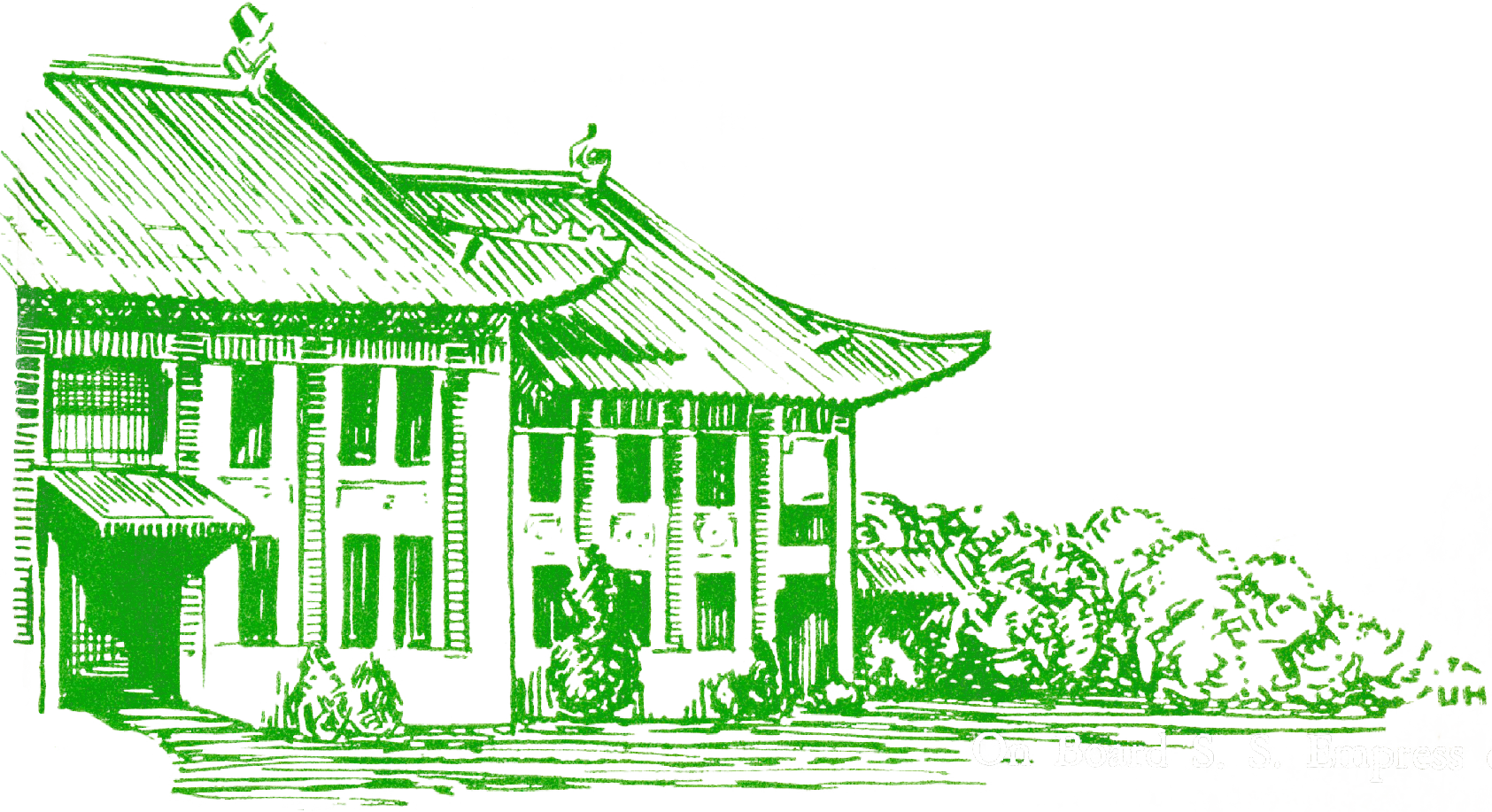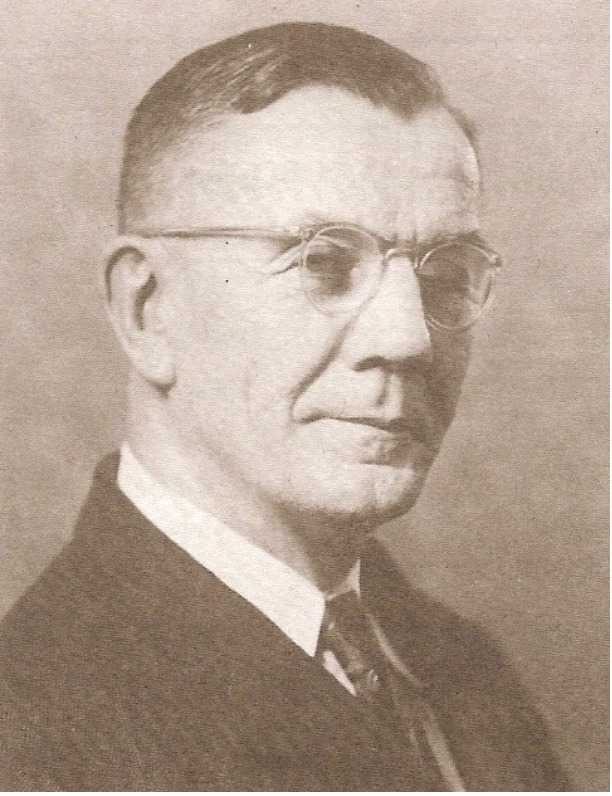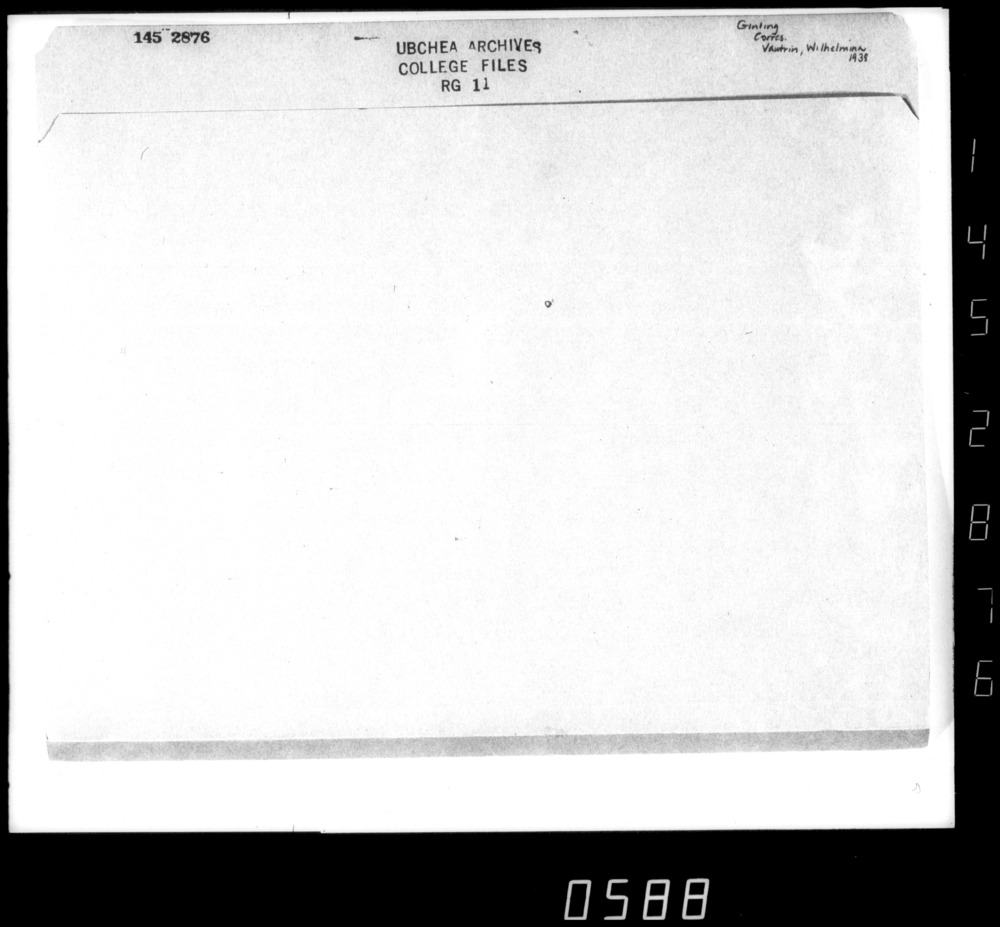Miner Searle Bates Letters
Miner Searle Bates is one of the more prominent figures of the Nanjing Massacre. During his time as a history professor at Ginling College, Bates was involved in numerous missionaries committee, one being the Nanking International Relief Committee. This relief committee had supervised the Nanking Safety Zone, a demilitarized zone that had been a safe space for refugees, including Chinese residents and officials, during the Second-Sino Japanese War, especially during the Nanjing Massacre. Bates along with many other faculty members of Ginling College were consistently documenting their experiences in Nanking throughout the massacre to call attention to the abuse and violence that was disguised by Japanese officials. In this page, you will find a detailed letter written by Bates that had highlighted the gruesome experiences he witnessed, and as you hover over the texts you can find additional context/background information, as well as analysis of secondary sources from Japanese officials or anecdotes from real-life victims of the Nanjing Massacre.
- Additional context
- Person or institution
- Primary source
LETTERS FROM NANKING
These letters from Nanking were written by missionaries who stayed through the siege and capture of the capital and have remained for relief work. They have been eye-witnesses from the inside of the most terrible raping of a city in modern times: "You cannot imagine the anguish and terror", they say. Their truthful diary of events during the first month following the fall of the city should be published to the world, but it cannot be published yet over their names. For these missionaries are still in Nanking at the risk of their own lives and their letters were sent out through friends connected with the embassies and were put directly on a steamer at Shanghai, so escaped the Japanese censorship. However, I am circulating copies of the letters for a few trusted friends to read. Each letter came to me yesterday by airmail marked Not for Publication. It is vitally important that this request be respected in order to safeguard our brave friends in Nanking.
However, you can use these letters for reference and as background material and you can, of course, refer to the facts in them in a general way, without indicating the source of your information.
Frank W. Price, (Nanking)
1208 Rennie Ave.,
Richmond, Virginia.
Nanking, 10 Jan. 1938.
Not for Publication.
Dear Friends:--
A few hasty jottings amid rape and bayonet stabs and reckless shooting, to be sent on the first foreign boat available since the situation developed after the Japanese entry -- a U.S. Navy tug engaged in the salvage work on the "Panay". Friends in Shanghai will pick this up from the Consulate-General , and will get it away somehow on a foreign boat without censorship.
Things have eased a good bit since New Years within the crowded Safety Zone, largely through the departure of the main hordes of soldiers. "Restoration of discipline" very scrappy indeed, and even the military police have raped and robbed and ignored their duties. A new turn may come at any moment, through fresh arrivals or vacillations in action. There is no policy visible. At last foreign diplomats have been allowed to re-enter (this week), which seems to indicate a desire for stabilization.
More than ten thousands unarmed persons have been killed in cold blood. Most of my trusted friends would put the figure much higher. These were Chinese soldiers who threw down their arms or surrendered after being trapped; and civilians recklessly shot and bayoneted, often without even the pretext that they were soldiers, including not a few women and children. Able German colleagues put the cases of rape at 20,000. I should say not less than 8,000, and it might be anywhere above that. ON University property alone, including some of our staff families and the houses of Americans now occupied by Americans, I have details of more than 100 cases and assurance of some 300. You can scarcely imagine the anguish and terror. Girls as young as 11 and women as old as 53 have been raped on University property alone. On the Seminary Compound, 17 soldiers raped one woman successively in broad daylight. In fact about one-third of the cases are in the daytime.
-2- NOT FOR PUBLICATION.
Practically every building in the city has been robbed repeatedly by soldiers, including the American, British, and German Embassies or Ambassador's residences, and a high percentage of all foreign property. Vehicles of all sorts, food, clothing, bedding, money, watches, some rugs and pictures, miscellaneous valuables, are the main thing sought. This still goes on, especially outside the Zone. There is not a store in Nanking, save the International Committee's rice shop and a military store. Most of the shops after free-for-all breaking and pilfering were systematically stripped by gangs of soldiers working with trucks, often under the observed direction of officers, and then burned. We still have several fires a day. Many sections of houses have also been burned deliberately. We have several samples of the chemical strips used by soldiers for this purpose, and have inspected all phases of the process.
Most of the refugees were robbed of their money and at least part of their scanty clothing and bedding and food. That was an utterly heartless performance, resulting in despair on every face for the first week or ten days. You can imagine the outlook for work and life in this city with shops and tools gone, no banks or communications as yet, some important blocks of houses burned out, everything else plundered, and now open to cold and starving people. Some 250,000 are here, almost all in the Safety Zone, and fully 100,000 entirely dependent on the International Committee for food and shelter. Others scraping along on tiny holdovers of rice and the proceeds of direct and indirect looting. Japanese supply departments are beginning to let out for monetary and political reasons a little of the rice confiscated from considerable Chinese Government supplies, though the soldiers burned not small reserves. But what next? When I asked Japanese officials about post and telegraph services, they said, "There is no plan." And that seems to be the case with everything economic and most of things political.
The International Committee has been a great help, with a story little short of miraculous. Three Germans have done splendidly, and I'd almost wear a Nazi badge to keep fellowship with them. A Dane and three Englishmen aided a good deal in the preliminary stages, but were pulled out by their companies and governments before the Chinese retired from Nanking. So the bulk of the work has come on American missionaries, only nine of whom have been outside of the confining strain of the Hospital filled with bullet and bayonet cases, and of course some of us have had varying duties and conceptions of duty. Naturally there has been considerable Chinese aid and cooperation from the beginning, and most of the detail has had to be done by and through the actual presence of a foreigner willing to stand up to a gun when necessary. We have taken some big risks and some heavy wallops (literally as well as figuratively), but have been allowed to get away with far more than the situation seems to permit. We have blocked many robberies, persuaded or bluffed many contingents into releasing groups marked for death, and pulled scores of soldiers away from rape, besides all the general work of feeding, sheltering, negotiation, protecting and protesting after sticking our noses and eyes into everything that has gone on. It is no wonder that a Japanese Embassy official told us the generals were angry at having to complete their occupation under the eyes of neutral observers, claiming (ignorantly, of course,) that never in the history of the world had that been true before.
Sometimes we have failed cold, but the percentage of success is still big enough to justify the considerable effort. We must recognize that although in some points the relationship is far from satisfactory, we have gained a good deal by the effort of the Japanese Embassy to put cushions between the army and foreign interests, the relative decency of their Consular Police (few and not altogether angelic), and by the fact that the main figures of the enterprise have been Germans of the Anti-Comintern Pact and Americans to be appeased after the barbarous attacks on American ships. The Japanese refused twice to send out for us a mild request for there turn of American officials, because of the great number of property cases and flag problems; and even with this week's improvement we are still in practical isolation even from the countryside and riverfront, except for the opportunities of American naval wireless through the Embassy for a limited scope of messages..
No mail since Dec.1, and that most tardy. Electric light in our house last night by special arrangement (seven Americans, among whom were personal links to the staff of the power plant), Japanese shot 43 of the 54 technical men on the staff, falsely accusing them of being government employees. Bombing shelling, and fires on top of that, and you can imagine that utilities are slow in resumption. But insecurity of worker and their families was the main stumbling-block at that. Water depends on electric pumps, but we are beginning to get a trickle at low levels of the city. No dream of telephones or bus or even rickshas. The Zone is about two square miles in area, not all built up. In this concentration we have had no accidental fires of notice, and practically no crime or violence except that of soldiers, until this present week's turning "to loot outside that area in opening buildings-especially for fuel.
(No armed police)
The University has 30,000 refugees on various parts of its property. Problems of administration are fearful, even on the low scale of living that can be maintained. We have very few indeed of regular University Staff and servants, most of whom have done splendid work. There are any volunteer helpers hastily got together by the International Committee who have come with considerable adulteration of motives. But we must add delation and the intimidation and purchase of agents by the Japanese. I'm in 'three hot spots right now over this sort of business, and begin to wonder if they are out to get me or this University into a corner. For instance, the two occurring in the past three days involve a contradiction of my report of losses for the University Middle School (thus putting me down for lying and cheating to the Japanese, and striking between me and a key man in that tremendous; refugee Camp); and a severe shove through the gate of a terrible military police Officer when I tried to: inquire about a good-spirited interpreter whorl they carried off bound for death (after he had refused to leave the Middle School camp to accept their offers or submit to their threats). Incidentally, police from that office last night took a woman from a University house and raped her thoroughly, after putting a bayonet against our man Riggs when he happened along at the wrong time. So you get a little of the flavor of our daily diet while struggling to do something for these wretched but remarkably durable and cheerful people.
The real military police numbered 17 at the time that over 50,000 soldiers were turned loose in Nanking, and for days we never saw one. Eventually soldiers were given special arm-bands and called police, which means that they have special preserves for their own misdeeds, and keep out some. of the ordinary run. We have seen men scolded for being caught by officers in the, act. of rape, and let go; others, made to salute an officer following robbery. One motorized raid on the University at night was actually conducted by officers themselves, who pinned our watchman to the wall and raped three women refugees, before carrying off one of them (another was a girl , twelve years old)...
How long this state will continue we do not know. Chinese have been greatly afraid lest Americans or all foreigners would be expelled from Nanking, but they seem more afraid to have us go than to have us stay - so far….But it's hard going. Four weeks today! The shells and bombs were almost comfortable if we had only known it. And what's ahead?
M. Searle Bates,
University of Nanking.
The Women's Media Center, a nonprofit organization dedicated to researching and writing on underrepresented women reported that "some Japanese government officials have denied the scale of the massacre, simply saying that such claims of Japanese-perpetrated atrocities in Nanking amounted to little more than anti-Japanese sentiment. Japanese Prime Minister Shinzo Abe said in 2013 that the post-World War II trials Japan underwent were nothing more than “victor’s justice".
As Price mentions, the Japanese were committed to silencing the Chinese residents, including foreign missionaries. The works of missionaries like Bates was focused on bringing awareness to the atrocities and violence that was going on during the Nanking Massacre. They hoped that other countries, such as the United States or Germany, would use their political power to move out Japanese soldiers from China.
“Nanking.” Women's Media Center, www.womensmediacenter.com/women-under-siege/conflicts/nanking.
Frank W. Price was a missionary of the Presbyterian Church in the U.S. He continued his missionary work in China and became a Professor at the Nanking Theological Seminary. During the Second Sino-Japenese War he aimed to bring light to the atrocities of the massacre and accounted for this in his own letters. He also was elected co-chairman of the Nanking Internation Relief Association.
On December 12, 1937, the U.S. Navy's boat "Panay" was attacked by the U.S. Navy tug engaged in the salvage work on the "Panay".e Japenese army, yet Japan had claimed that this was a mistake despite the visibility of multiple American flags on the boat. The attack left 3 wounded and many more wounded. The Panay was anchored near Nanking China to provide surveillance throughout the Yangtze River.
“‘Two Japans.’” National Archives and Records Administration, National Archives and Records Administration, www.archives.gov/publications/prologue/2001/summer/two-japans-1.html.
Victims of the Nanking Massacre had experienced violence and abuse starting at a very young age that continued to linger on throughout their adult lives. As accounted for by a victim of the massacre, the trauma she had endured became a negative impact on her mental wellbeing. As stated in the article, "Grandma Du was raped near Xiaolingwei by a Japanese soldier when she was 8 years old. Haunted by the lingering nightmarish memory, she ended up having three unhappy marriages" (p.262)
Lianhong, Zhang. “The Nanjing Massacre and the Traumatic Memory of Nanjing Residents.” Chinese Studies in History, vol. 50, no. 4, 2017, pp. 258–265., doi:10.1080/00094633.2017.1404785.
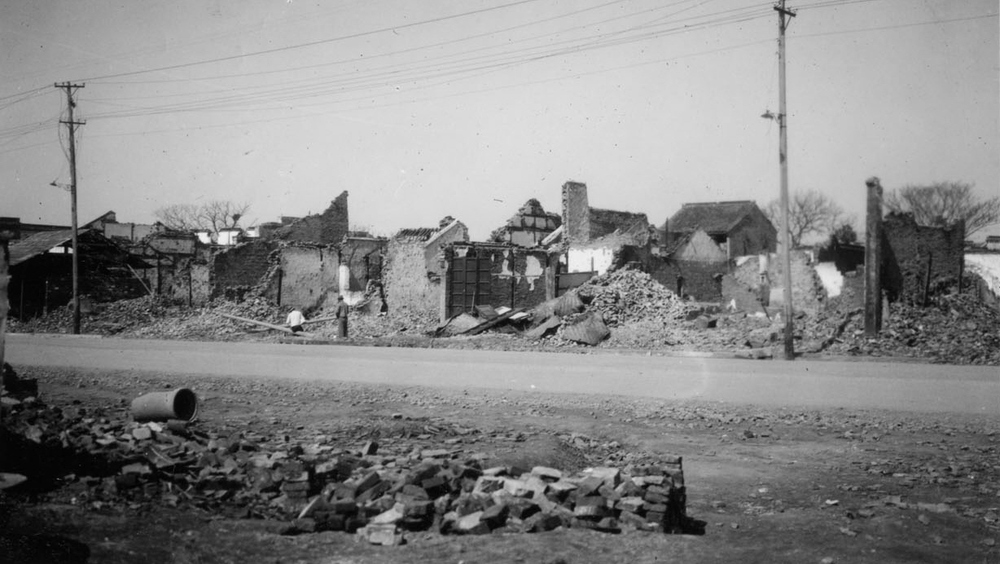
"War damage in the southern section of Nanking where most of the fighting in connection with the fall of the city took place. Picture taken March 17, 1938."
“War Damage in The Southern Section of Nanking.” The Nanking Massacre Project: Photographs and Films, image courtesy of the Yale Divinity Library, Yale University, divinity-adhoc.library.yale.edu/Nanking/Images/YDS-RG008-265-0002-0049.jpg.
"Our International Committee for Nanking Safety Zone had been negotiating with
both the Chinese and Japanese for the recognition of a certain area in the city
which would be kept free of soldiers and military offices and which would not be bombed or shelled, a place where the remaining two hundred thousand of Nanking's population of one million could take refuge when things became too hot ... "
Shigenobu, Tomisawa. “Using Primary Sources To Clarify the Nanking Incident.” Society for the Dissemination of Historical Fact, www.sdh-fact.com/CL02_1/57_S4.pdf.
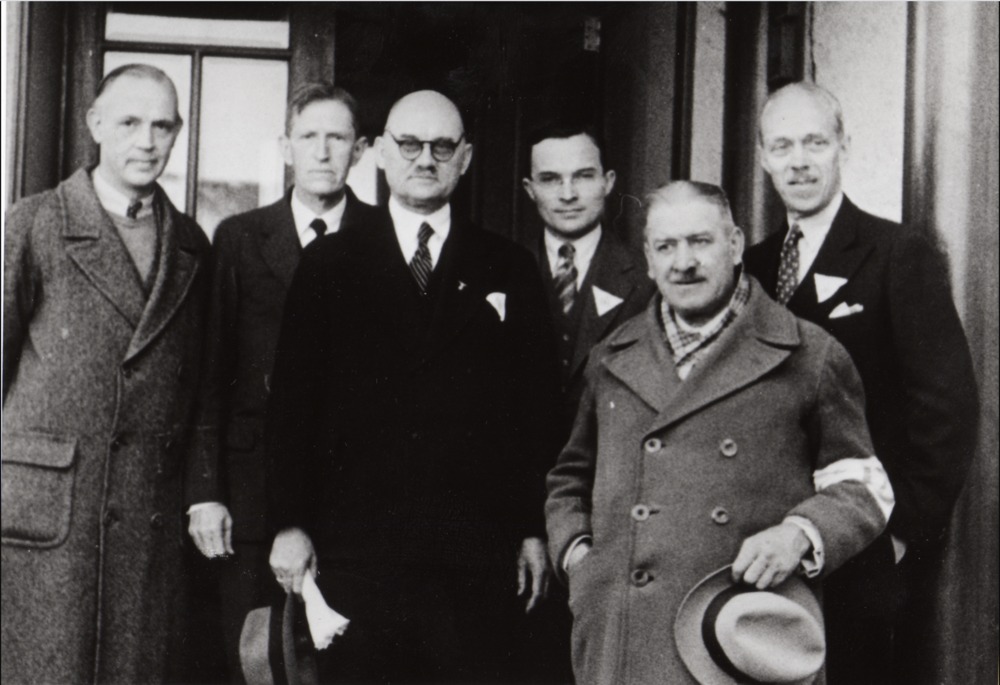
Members of the Nanking International Safety Zone Committee.
Left to right: Ernest Forster, W. Plumer Mills, John Rabe, Lewis Smythe, (Rohe / Sperling?),
George Fitch. From Paramount News Reel. Nanking China. About December 15, 1937
“Members of the Nanking International Safety Zone Committee.” The Nanking Massacre Project: Photographs and Films, image courtesy of the Yale Divinity Library, Yale University, divinity-adhoc.library.yale.edu/Nanking/Images/YDS-RG008-265-0003-0098.jpg
On November 25 of 1936, Germany and Japan made an agreement, more specifically an anti-Communist pact. The two nations joined as a military alliance to prevent the spread of communism globally.
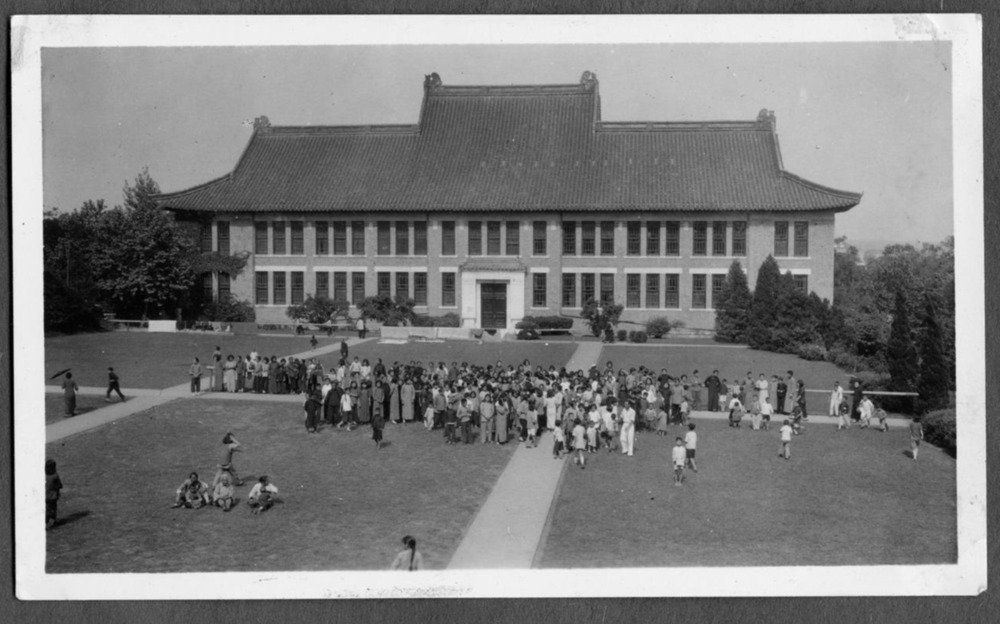
Refugees on campus of University of Nanjing, Nanjing, China,1938
"Some of the refugees on the campus of the University of Nanking, which accomodated about 10,000 in its various buildings. This picture was taken in March 1938.
Ernest Forster, the photographer, was an American Episcopal missionary who stayed in Nanjing during the period of the Japanese occupation, 1937-1938.
Also included in the International Mission Photography Archive."
“Refugees on campus of University of Nanjing, Nanjing, China,1938.” China Records Project Miscellaneous Personal Papers Collection, image courtesy of the Yale Divinity Library, Yale University, http://hdl.handle.net/10079/digcoll/994372
